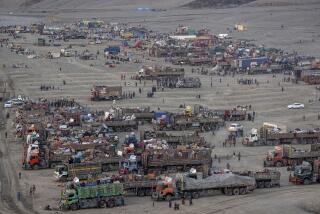May Resume Expelling Refugees, Zairians Say
- Share via
GOMA, Zaire — Officials here say they may go back to expelling refugees at gunpoint if the United Nations does not get the 1.2 million people who have camped along Zaire’s border for more than a year to go home soon.
“We are crushed here,” said Mayor Mashako Mamba Sebi, summing up the exasperation felt by Goma residents, who numbered about 200,000 before the arrival of the Rwandan and Burundian refugees.
Several dozen Rwandans left Saturday on U.N. trucks, but not even the threat of more forced expulsions could budge the vast majority from the flyblown camps that have become the refugees’ homes.
Under a scorching sun, those remaining gathered sticks and rebuilt huts torched by Zairian soldiers last week in a five-day sweep aimed at driving out the refugees.
About 15,000 were forced home, but an estimated 173,000 others fled into the countryside, and aid officials warned that another humanitarian crisis was brewing.
Zaire suspended the forced expulsions after the Office of the U.N. High Commissioner for Refugees agreed to resume a voluntary repatriation program, and the refugees then returned from the hills to their camps.
“What happened this past week was a good thing, because the international community was asleep,” Goma’s mayor said. “But if things don’t move, we’ll be obliged to start again.”
Since the voluntary repatriation program began Friday, only about 250 refugees have come forward--200 the first day, 47 the next. No repatriations were held Sunday, a day off for the refugee agency.
Refugee agency officials, who say they have the capacity to bus home 5,000 daily, say it’s far too early to declare the repatriation effort a failure. The issue was to be discussed today in Geneva between Zairian Prime Minister Leon Kengo wa Dondo and the U.N. refugee commissioner, Sadako Ogata.
Zaire was expected to demand guarantees of faster repatriations before promising a permanent halt to expulsions.
Nearly all the refugees are Hutus, the ethnic majority blamed for the massacre of at least 500,000 Rwandans during last year’s civil war. Most victims were minority Tutsis, the ethnic group that defeated the former Hutu regime and now holds power in Rwanda.
Hutus fear retribution from Tutsis if they return to Rwanda or Burundi, which has the same ethnic divisions as Rwanda.
More to Read
Sign up for Essential California
The most important California stories and recommendations in your inbox every morning.
You may occasionally receive promotional content from the Los Angeles Times.













